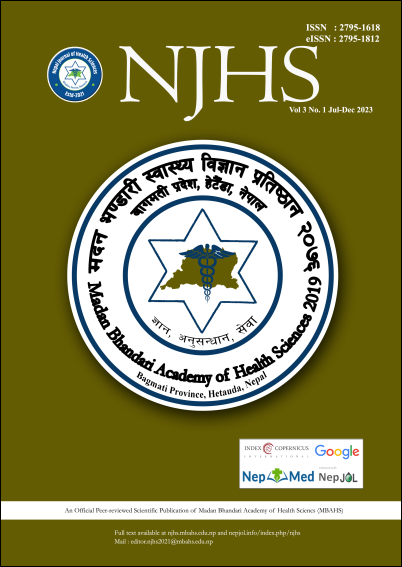Empathy among Undergraduates in an Academy of Health Sciences in Hetauda, Nepal
DOI:
https://doi.org/10.3126/njhs.v3i1.63302Keywords:
Empathy, health professionals, Jefferson Scale of Empathy Health Profession Students’ versionAbstract
Introduction: Empathy is the ability to understand one’s perspective and experience, and further use this understanding to communicate with the other person. It has been incorporated as one of the learning objectives by the Association of American Medical Colleges. Empathy in a profession may decline with the pressure of a job or the other way may improve with experience.
Objectives: The objective of this study is to measure the empathy score among undergraduate students of an Academy in Hetauda.
Methods: This is a cross sectional analytical study conducted among 96 undergraduate students. Jefferson Scale of Empathy Health
Profession Students’ version was used to measure the empathy scores among the participants.
Results: The mean empathy score of the students in Madan Bhandari Academy of Health Sciences was 98.71±15.62. Mean empathy score was significantly higher among the female participants (103.56 ± 14.07 vears 93.43 ± 15.66). The highest mean empathy score was observed among the third semester students 110.18±11.28. A significant difference was observed among the mean empathy values in accordance with discipline where Bachelors of Public Health had the highest mean empathy value 107.95±12.65. In accordance with age the relatively younger age group had higher mean empathy value where males had a mean value of 104.03 ± 13.85 and females had a mean value of 95.83 ± 15.73.
Conclusion: Females had a higher mean empathy score than males. Students in the third semester had the highest mean empathy score. Relatively younger students had a mean higher empathy score.
Downloads
Downloads
Published
How to Cite
Issue
Section
License
Copyright (c) 2023 NJHS

This work is licensed under a Creative Commons Attribution 4.0 International License.




